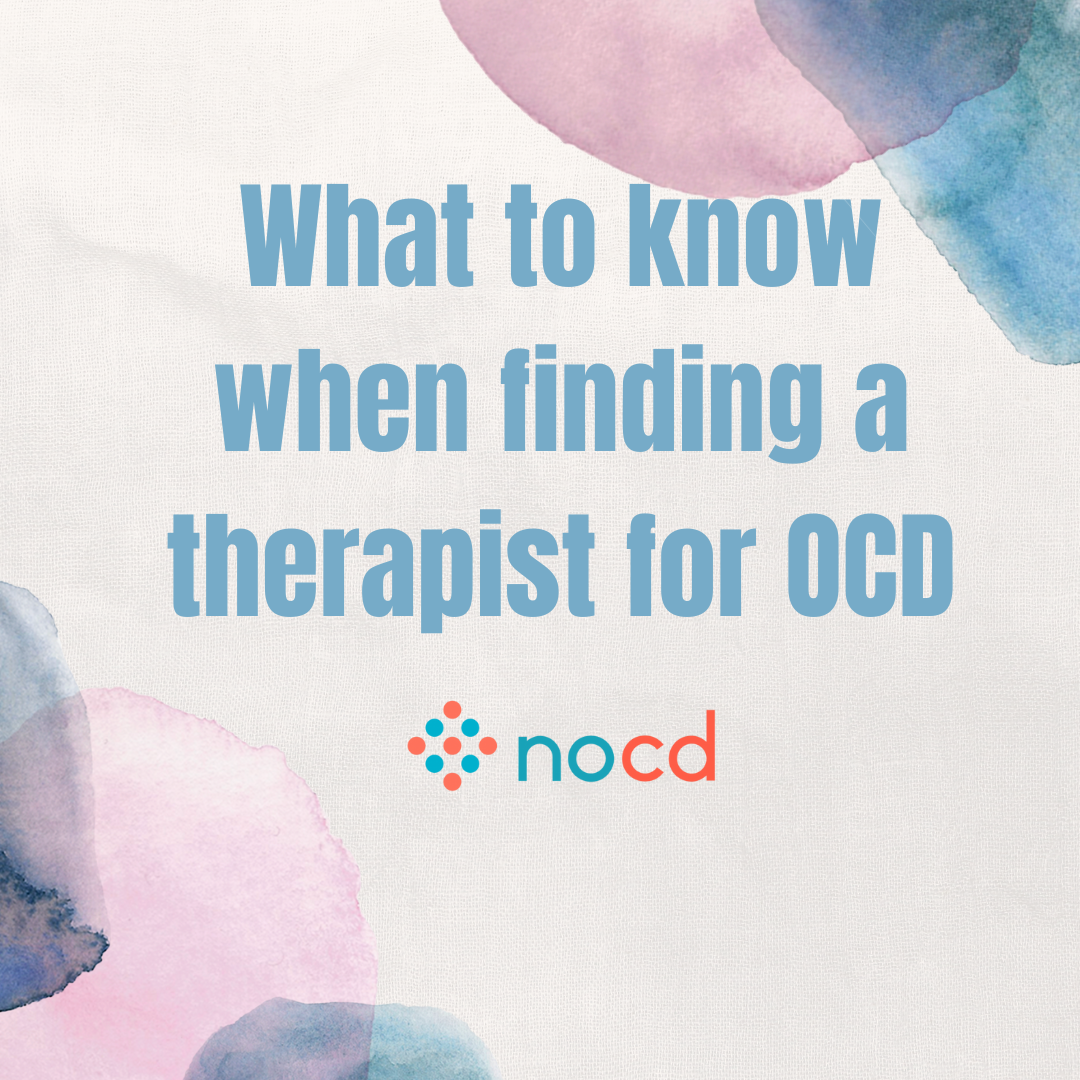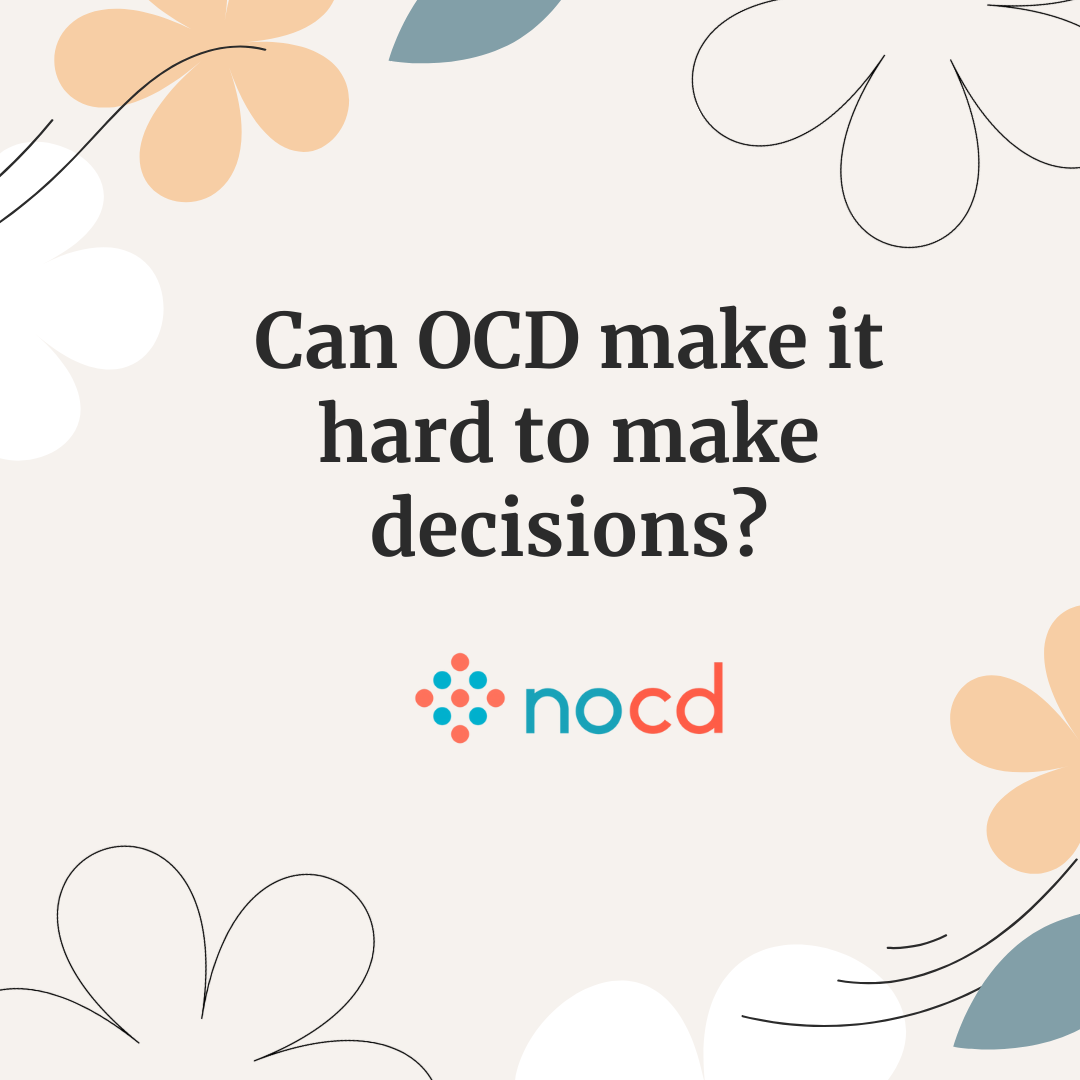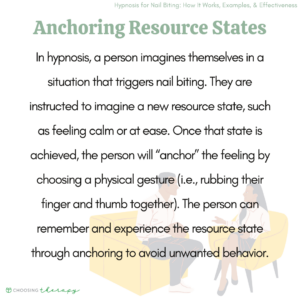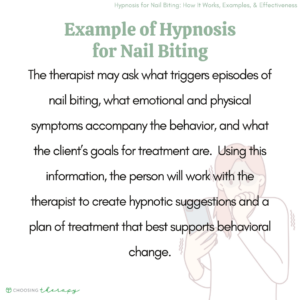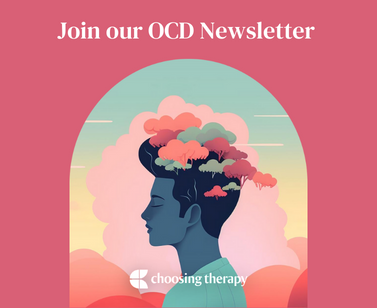Hypnotherapy can be effective in treating many anxiety-related behavioral issues like nail biting. Hypnosis can help decrease the urge to nail-bite by resolving conflicts in the conscious and subconscious mind to achieve the desired change. Techniques often include pattern interruptions, anchoring, and memory regression.
Nail Biting Is Often A Sign Of OCD
Many people with onychophagia also struggle with misdiagnosed OCD. The first step to getting help is an accurate clinical assessment and diagnosis. NOCD’s therapists will provide a comprehensive assessment of your experience. If they find that you do not meet the criteria for OCD, they will still help assist you in identifying what you may be experiencing. Get Started With A Free 15 Minute Call
What Is Hypnotherapy?
Hypnosis, or hypnotic trance, is a state of physical and mental relaxation where the critical faculty is bypassed, opening a person to accepting positive suggestions for change. Although some people appear resistant to hypnosis, they can benefit from the process by following the therapist’s suggestions as best they can.1
Concepts of hypnotherapy include:
Physical & Mental Relaxation
The first step in achieving a hypnotic trance is to relax both physically and mentally. This is accomplished by moving through progressive attention through each body part. The therapist will guide the person with relaxing suggestions and imagery to help release tension. Once the body is relaxed, mental relaxation is more easily achieved, giving rise to feelings of ease and peacefulness.
Bypassing the Critical Faculty
The mind’s critical faculty analyzes, evaluates, and helps to make decisions. Even though it serves an essential function, it is sometimes not enough to create lasting change. In the case of someone who bites their nails, they may consciously decide to stop the habit but find themselves struggling to do so. This is because deeply ingrained habits and motivations are stored in a deeper part of the mind called the subconscious.
In the trance state, the critical faculty can be bypassed once the person is sufficiently relaxed and focused. This allows the person to connect directly with the subconscious mind and work with present powerful beliefs and motivations. A person may discover their nail biting is based on a deep need for safety. The therapist can then help the person find new, healthy solutions to meet those needs.
Hypnosis for Nail Biting: Does It Work?
People who experience mild to severe onychophagia can benefit from hypnotherapy to manage, control, and even eliminate the urge to bite their nails. Nail biting, or onychophagia, can be a temporary and relatively nondestructive behavior. However, it can also be a severe, long-term problem for some people.2 In that case, the disorder is characterized by chronic, seemingly uncontrollable nail biting that is destructive to fingernails and the surrounding tissue.
Some of the symptoms of onychophagia include:
- Feelings of distress, unease, or tension before biting
- Feelings of relief or even pleasure during and after biting
- Shame, guilt, and embarrassment related to the visible physical damage to skin and nails caused by biting
- Tissue damage to fingers, nails, and cuticles
- Dental problems, abscesses, and infections
- In some cases, nail biting may lead to complicated family and social relationships
Treatment For OCD NOCD: Online OCD Treatment Covered By Insurance – Regain your life from OCD. Do live video sessions with a licensed therapist specialized in treating OCD. Treatment from NOCD is covered by most major insurance plans. Learn how you can use your insurance benefits. Visit NOCD Talkiatry: Is OCD Medication Right For You? Speak with A Doctor – Talkiatry can match you with a psychiatrist who takes your insurance and is accepting new patients. They’re in-network with major insurers and offer medication management with supportive therapy. Free Assessment
How Can Hypnotherapy Help Someone With Nail Biting?
It is natural for people to experience some stress and anxiety from time to time. However, when these uncomfortable feelings result in body-focused repetitive behaviors (BFRBs) such as nail biting, hair pulling, or skin picking, a person’s quality of life can be adversely affected. With its emphasis on physical and mental relaxation, hypnotherapy can be a highly effective treatment for various BFRBs.
Hypnotherapeutic techniques for nail biting include:
Relaxation
The therapist will guide the person through progressive attention to each body part to achieve sufficient relaxation to enter the hypnotic trance state. The person can release tension and stress through mindfulness, focused awareness, and soothing suggestions. Once physical relaxation is achieved, mental relaxation comes more easily. Through this process, symptoms of stress and anxiety that can trigger the nail biting behavior are often greatly reduced.
Pattern Interruption Techniques
Specific feelings or situations often trigger nail biting and other BFRBs. By becoming aware and mindful of these triggers, a person can apply “pattern interruption” techniques. When a trigger is noticed, the person can begin a physical action, such as tapping their hand or wrist, while repeating a positive statement like, “I am feeling anxious, and I can choose to do something other than biting my nails.”
Anchoring Resource States
In the dreamlike state of hypnosis, a person imagines themselves in a situation that triggers nail biting. With the therapist’s guidance, they are instructed to imagine a new resource state, such as feeling calm or at ease. Once that state is achieved, the therapist will ask the person to “anchor” the feeling by choosing a physical gesture like making a gentle fist or rubbing their finger and thumb together. When the anchor is engaged in the future, the person can remember and experience the resource state and avoid unwanted behavior.
In addition to these techniques, many hypnotherapists will suggest various self-management tools to deal with the nail biting urge in the future. These can include instructions for self-hypnosis, deep breathing exercises, and self-guided relaxation meditations.
It should be noted that some conditions may benefit from the support of other treatments, such as cognitive behavioral therapy (CBT). However, hypnosis as a complementary treatment can increase the chances for successful outcomes in behavior change.
Online Treatment For Body Focused Repetitive Behaviors (BFRBS) NOCD Therapists are specialized in treating BFRBs. Many people struggle with both OCD and BFRBs. Working with a therapist who has specialized training in treating both conditions can help you get your life back.
Example of Hypnosis for Nail Biting
Typical hypnosis treatment for nail biting will include an initial assessment, several hypnosis sessions, and follow-up support. During the initial interview, a person may be asked about their past and current experience of chronic nail biting. As this can be connected with another medical and mental health issue, a therapist will likely ask about any past or current treatments so they can coordinate with other providers as needed.
The therapist may also ask what triggers episodes of nail biting, what emotional and physical symptoms accompany the behavior, and what the client’s goals for treatment are. They may review any mental images, inner dialog, looping thoughts, and physical sensations that precede the urge to nail biting. Using this information, the person will work with the therapist to create hypnotic suggestions and a plan of treatment that best supports behavioral change.
Post Hypnotic Suggestions
While in hypnosis, a person is more amenable to accepting and implementing positive suggestions. These are most effective when delivered in the present tense. For example, “Whenever I feel the urge to bite my nails, I remember to breathe and relax.” The key to post-hypnotic suggestions is they are both believable and offer desirable alternative responses to the behavior.
Future pacing
Typically, a person experiences a problem state feeling at the mercy of whatever has triggered it. Future pacing is a technique that effectively teaches a person how to imagine and expect more desirable outcomes. While in a trance, the person will imagine themselves in a situation where they are likely to bite their nails. They will then be instructed to imagine themselves feeling safe, at ease, and in control. They may then imagine successfully resisting the urge to bite their nails and feel all the positive feelings associated with that success.
Memory Regression
Often, unwanted behaviors have their source in traumatic memories of past events.3 In hypnosis, one may revisit those memories with better resources. For example, the person who bites their nails may remember a situation they engaged in this behavior as a child. In the trance state, they can re-experience the event with the full knowledge that they are now more capable of protecting themselves as adults.
Final Thoughts
Nail biting can be a troublesome habit or compulsion, but hypnotherapy may offer an effective way to stop the behavior. Consider reaching out to a hypnotherapist or other mental health professional to address the causes behind your nail biting.
To help our readers take the next step in their mental health journey, Choosing Therapy has partnered with leaders in mental health and wellness. Choosing Therapy is compensated for marketing by the companies included below. OCD Therapy NOCD: Effective, Affordable, & Convenient OCD Therapy Do live, face-to-face video sessions with a therapist who specializes in treating OCD and get 24/7 support between sessions. NOCD is covered by many insurance plans and is available nationwide. Visit NOCD Virtual Psychiatry Talkiatry Get help from a real doctor who takes your insurance. Talkiatry offers medication management and online visits with expert psychiatrists. Take the online assessment and have your first appointment in days. Free Assessment OCD Newsletter A free newsletter from Choosing Therapy for those impacted by OCD. Get helpful tips and the latest information. Sign-UpAdditional Resources
For Further Reading
The following are helpful additional resources for anyone interested in hypnosis for nail biting:
- The American Hypnosis Association
- How to Stop Biting Your Nails | The American Academy of Dermatology Association
- Nail Biting Prevention and Habit Reversal Tips: How to Get Your Child to Stop | Nationwide Children’s
What to know when finding a therapist for OCD With so much information out there regarding providers and treatment options for obsessive compulsive disorder, it can be hard to know exactly where to start—especially when you have to consider everything from the type of provider to the different treatment methods, as well as how you’ll fit it into your busy schedule. Can OCD make it hard to make decisions? From choosing what to wear in the morning to picking what to eat for dinner, decision-making is a part of everyone’s daily routine. But for millions of people with Obsessive-Compulsive Disorder (OCD), making any choice can feel like a daunting, sometimes impossible task.